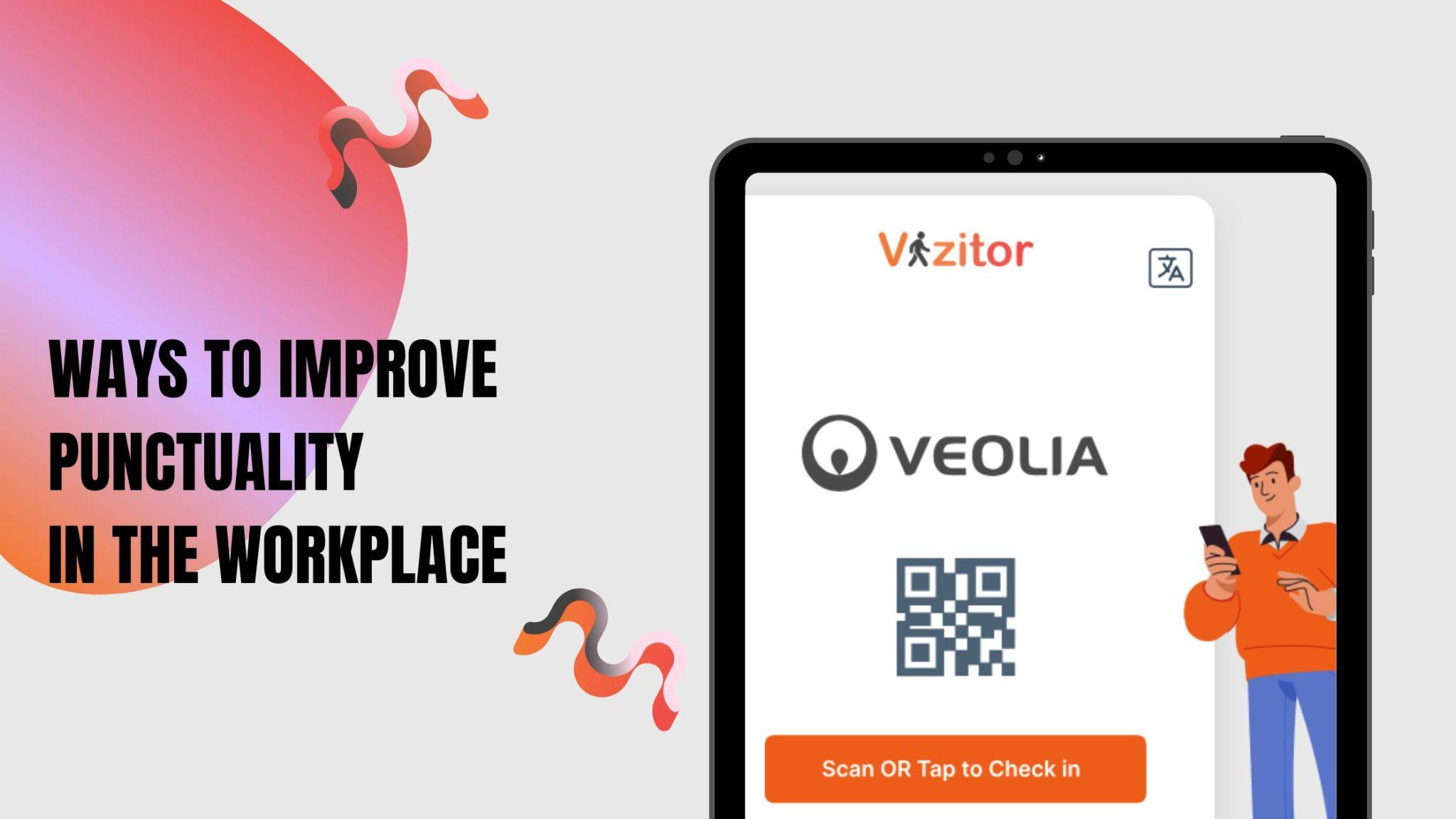Table of Content
Try Vizitor for Free!

Wed, Mar 5, 2025
Read in 9 minutes
Did you know? Studies show that 20% of employees struggle with punctuality, leading to productivity losses and workplace inefficiencies. Whether you’re a leader or an employee, being punctual matters for maintaining efficiency, professionalism, and respect in the workplace.
Understanding the Importance of Punctuality: Lessons from the Rabbit and the Hare
The classic story of The Rabbit and the Hare teaches us a timeless lesson. In the race to meet deadlines, the Rabbit represents steady progress and good time management, while the Hare shows rushed, last-minute work due to overconfidence and procrastination.
Punctuality in the workplace is much like the Rabbit’s approach – steady, reliable, and efficient.
What is Punctuality in the Workplace?
Punctuality at work means arriving on time, meeting deadlines, and being prepared for tasks. It’s more than just being early – it’s showing respect for others’ time and ensuring workplace efficiency.
Examples of Punctuality at Work:
- Office Manager: Arrives early to prepare schedules.
- Remote Employee: Logs in for virtual meetings on time.
- Salesperson: Joins client calls promptly, winning their trust.
Related: Learn How Improving Efficiency in the Workplace Boosts Productivity.
Why Does Punctuality Matter At The Workplace?
Punctuality matters in the workplace for several key reasons:
1. Efficiency: Being punctual ensures that tasks and meetings start on time, leading to smoother operations and less wasted time.
2. Professionalism: Being on time shows respect for others’ schedules and demonstrates reliability and commitment to your work.
3. Team Collaboration: Punctuality fosters better teamwork by enabling effective coordination and timely communication among team members.
4. Productivity: When everyone is punctual, work progresses more efficiently, deadlines are met, and productivity levels are higher.
5. Company Reputation: A punctual workplace reflects positively on the company’s image, conveying professionalism, organization.
The Role of Punctuality in Modern Workplace Culture
Punctuality is more than just arriving on time—it’s a cornerstone of modern workplace culture. With increasing emphasis on remote work and flexible schedules, being punctual takes on new forms, such as joining virtual meetings promptly, responding to emails within a reasonable timeframe, and adhering to project deadlines.
A culture of punctuality builds trust and accountability, making employees more reliable and teams more cohesive. It also contributes to a company’s reputation, showing clients and stakeholders that the organization values discipline and efficiency.
Common Causes of Being Late At Workplace
1. Traffic: Delays due to heavy traffic or transportation issues are a frequent cause of tardiness.
2. Procrastination: Waiting until the last minute to prepare for work or complete tasks can lead to running late.
3. Oversleeping: Not waking up on time or hitting the snooze button excessively can result in being late.
4. Unforeseen Circumstances: Unexpected events like car breakdowns, public transportation delays, or family emergencies can cause lateness.
5. Poor Time Management: Inefficient planning or prioritization of tasks can lead to difficulty in meeting deadlines or arriving on time.
6. Distractions: Getting sidetracked by distractions such as social media, personal phone calls, or unrelated tasks can contribute to being late.
7. Lack of Accountability: Not taking personal responsibility for punctuality or disregarding the importance of timeliness can also lead.
Why Does Punctuality Matter in the Age of Remote Work?
In an era where remote and hybrid work models are becoming the norm, punctuality isn’t limited to physical presence anymore. It also involves being digitally present, available, and prepared.
Key considerations for punctuality in remote work include:
- Logging in on time for virtual meetings and being prepared with relevant materials.
- Delivering projects by deadlines, regardless of your physical location.
- Respecting team collaboration by responding to messages and tasks promptly.
When teams operate remotely, the impact of tardiness can ripple across time zones, leading to inefficiencies. This makes punctuality even more critical in maintaining productivity and trust.
Building a Workplace Culture That Values Punctuality
- Communicate Core Values: Clearly articulate the importance of punctuality as part of your organization’s values. Highlight its connection to teamwork, respect, and efficiency.
- Incorporate Punctuality into Onboarding: Use onboarding sessions to emphasize the importance of time management and punctuality in your company culture.
- Celebrate Punctuality: Recognize employees who consistently demonstrate punctuality through public acknowledgments or rewards.
Addressing Common Myths About Punctuality
Myth 1: Being Late Occasionally is No Big Deal.
Reality: While occasional tardiness is understandable, habitual lateness disrupts workflows and affects team morale.
Myth 2: Punctuality Only Matters in Traditional Office Settings.
Reality: In remote and hybrid setups, punctuality is even more crucial to ensure smooth communication and avoid project delays.
Myth 3: Time Tracking Feels Like Micromanagement.
Reality: Modern time-tracking tools empower employees by helping them manage workloads effectively while providing insights to optimize productivity.
Real-Life Scenarios Highlighting the Value of Punctuality
Scenario 1: The Missed Meeting Opportunity: Imagine a client meeting where a team member arrives late. The delay not only wastes valuable time but also sets a poor impression on the client.
Lesson: Arriving on time shows professionalism, builds trust, and ensures discussions progress smoothly.
Scenario 2: The Project Deadline Race: A project manager procrastinates on initial tasks, leading to last-minute scrambling. This results in errors, reduced quality, and missed deadlines.
Lesson: Steady progress and meeting interim deadlines prevent rushed work and maintain quality.
Strategies for Improving Punctuality At Workplace
Improving punctuality in the workplace involves implementing effective strategies to encourage and maintain timely attendance. Here are some key strategies:
1. Establish Clear Expectations
Communicate the importance of punctuality and set clear expectations regarding arrival times, meeting schedules, and deadlines. Make sure everyone understands the consequences of tardiness.
2. Provide Flexibility
Consider offering flexible work arrangements such as flexible start and end times, compressed workweeks, or remote work options. This can help accommodate varying schedules and reduce stress related to commuting.
3. Incentivize Punctuality
Provide incentives for punctuality, such as rewards, recognition, or bonuses for consistently being on time. Positive reinforcement can motivate employees to prioritize punctuality.
4. Conduct Time Management Training
Offer training sessions or workshops on time management skills, emphasizing the importance of prioritization, organization, and effective task management. Provide tools and techniques to help employees manage their time more efficiently.
5. Utilize Technology
Use technology solutions like time-tracking software, calendar apps, and automated reminders to help employees stay organized and aware of their schedules. Implementing digital clock-in systems and alerts for upcoming meetings can also improve punctuality.
6. Lead by Example
Managers and team leaders should lead by example by consistently demonstrating punctuality and adherence to schedules. When leaders prioritize punctuality, it sets a positive tone and encourages others to do the same.
Tools To Use To Maintain Punctuality At Workplace
By leveraging the below tools and techniques, organizations can create a culture of punctuality, improve productivity, and enhance overall workplace efficiency.
1. Time-Tracking Software
Use time-tracking software to monitor employees’ attendance, work hours, and productivity. This can help identify patterns of tardiness and track improvements in punctuality over time.
2. Calendar and Task Management Apps
Encourage employees to use calendar and task management apps to schedule meetings, set reminders for deadlines, and prioritize tasks. These tools help individuals stay organized and manage their time effectively.
3. Clock-In Systems
Implement digital clock-in systems that require employees to clock in and out electronically. This helps track actual work hours and ensures accurate attendance records.
4. Automated Reminders
Set up automated reminders for important meetings, deadlines, and tasks. This can be done through email reminders, calendar alerts, or task management apps to ensure employees are aware of upcoming commitments.
5. Flexible Work Arrangements
Offer flexible work arrangements such as flexible start and end times, compressed workweeks, or remote work options. This can reduce stress related to commuting and help employees manage their schedules more effectively.
6. Incentive Programs
Create incentive programs that reward punctuality and attendance. This could include bonuses, recognition, or extra time off for employees who consistently arrive on time and meet attendance targets.
7. Time Management Training
Provide time management training sessions or workshops to equip employees with skills and techniques for better managing their time, prioritizing tasks, and meeting deadlines.
Did You Know?
Businesses lose an estimated 20% of potential revenue due to lateness and poor time management (Forbes). Implementing punctuality strategies can improve efficiency and boost morale, with companies that focus on time management seeing an average 20% increase in productivity (Harvard Business Review).
How This Can Help You
At Vizitor, we specialize in attendance management systems designed to help businesses improve punctuality and optimize their workflows. Our solution provides accurate, real-time tracking of attendance, reducing the risk of lateness and enabling more efficient scheduling. By automating clock-ins, tracking work hours, and providing actionable insights, our system helps organizations stay on top of employee attendance and productivity.
Final Boost: Ready to Improve Punctuality in Your Workplace?
Don’t let lateness hurt productivity.
Track time and attendance seamlessly with Vizitor’s Attendance Management System.
📅 Book a Demo and transform your team’s punctuality today!
Time’s Up!
In summary, being on time is important at work because it helps everything run smoothly and makes us more efficient. When companies make it clear that punctuality matters, use tools to track time, and offer flexible work options, it creates a culture where being on time is valued.
Benjamin Franklin’s quote, “Lost time is never found again,” reminds us how valuable time is and why we should use it wisely. Being punctual doesn’t just help us as individuals—it makes the whole workplace better and more successful.
Frequently Asked Questions
1. How Can You Improve Punctuality in the Workplace?
You can improve punctuality at work by setting clear expectations about being on time, using tools like reminders and time-tracking apps, offering flexible work options, and providing incentives for being punctual.
2. Why Is Punctuality Important in the Workplace?
Punctuality is important in the workplace because it ensures smooth operations, fosters professionalism and demonstrates respect for others’ time.
3. How Do You Develop Good Attendance and Punctuality?
Developing good attendance and punctuality involves being organized, managing your time effectively, prioritizing tasks, avoiding procrastination, and being aware of the impact of being late on your work and team.
4. What Is an Example of Punctuality in the Workplace?
An example of punctuality in the workplace is arriving at work or meetings on time, completing tasks within deadlines, and consistently showing up for work as scheduled without being late.
5. Why Is Punctuality Important in Work?
Punctuality is important at work because it shows reliability, professionalism, and respect for others’ time. It contributes to smooth operations, effective teamwork, meeting deadlines, and overall workplace productivity.
6. How can setting realistic deadlines improve workplace punctuality.
Setting realistic deadlines allows employees to plan ahead, avoid last-minute stress, and complete tasks efficiently. It also prevents workplace delays caused by misjudged task durations.
7. Why is task prioritization essential for being punctual?
Prioritizing tasks helps employees focus on the most critical work first. By using strategies like the Eisenhower Matrix or time-blocking, employees can manage their workload efficiently and meet deadlines without delays.










